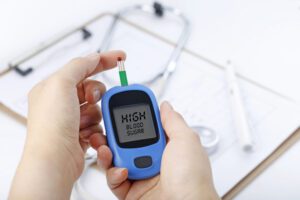Read on and identify the common symptoms of hyperthyroidism:
Hyperthyroidism happens when the thyroid gland produces way too many hormones. A wide range of symptoms, including weight loss, irritability, an irregular heartbeat, tremors, sleeplessness, hair loss, and more, may arise from the whole-body effects of this.
Even if it’s a condition that affects about 1.3% of the population, women are more likely to develop it, and the risk of hyperthyroidism may increase with age. It’s a small percentage, that’s for sure, but it’s still safe to have regular visits to your doctor to make sure everything is all right.
Potential side effects of hyperthyroidism include atrial fibrillation, pregnancy issues, and weakening of the bones; however, these are more likely when the condition is left untreated or unmanaged. Continue reading to find out more about but also the most common symptoms of hyperthyroidism.

Insomnia
The majority of hyperthyroidism sufferers have one or more of the following signs and symptoms. Although these symptoms usually appear gradually, they can also start suddenly, particularly in young individuals. The symptoms of hyperthyroidism, however, are often less severe and fewer in older individuals than in younger ones. Sadly, the entire body, from top to bottom, can be impacted by hyperthyroidism.
One of the most common symptoms of hyperthyroidism is insomnia and problems focusing or remembering things. Besides not being able to sleep properly at night, this condition also leads to behavioral and psychological abnormalities, including melancholy, anxiety, jitters, and/or irritability.
Increased body sweat
Sweating more than usual because the body is producing more heat is another typical hyperthyroidism symptom. Heat intolerance, a condition where an individual finds it difficult to tolerate heat or activities that induce further heat production, such as exercise, is associated with this high level of sweating.
More energetic than usual
This may sound like a good thing, especially if you’re a person who isn’t that energetic all the time. However, don’t get fooled by this because it is one of the common symptoms of hyperthyroidism. Why is this happening? Because the metabolism accelerates, proper treatment is crucial to avoid breakdown and constant fatigue.
Keep in mind that certain medications can hide hyperthyroidism so if you don’t experience any of these signs but you take beta-blockers to treat high blood pressure tell the doctor about them. They might recommend stopping the treatment for a bit to get accurate blood tests.
Frequent Bowel Movements
Due to an increase in gut motility, hyperthyroidism can cause digestive symptoms such as dyspepsia frequent bowel movements, and diarrhea. Furthermore, urinating more often than usual, especially during the night, is also a sign you might have issues with your thyroid.
Do you want to check your body temperature to see if everything is all right? Instead of rushing to the doctor, buy your own thermometer. This oral thermometer for adults with a 10-second fast reading is available on Amazon for just $9.99.
Irregular heartbeats
Issues with your heart are one of the most common symptoms of hyperthyroidism. A person who suffers from this condition will often feel their heart beating faster than normal. This is because accelerating heart-pumping cycle. An overactive thyroid gland can also result in high blood pressure irregular heartbeats, or arrhythmias.

Rapid weight loss
Do you feel like no matter how high your appetite is, you’re still losing weight? Losing weight is something that many people desire but when you suffer from hyperthyroidism this happens deliberately because of an accelerated metabolism.
Even with more food consumption, weight reduction results from the body burning calories more quickly. If you’re experiencing this and you don’t follow a specific diet for weight loss, it’s advisable to speak to a doctor and ask for some tests.
Neck discomfort
A few people with hyperthyroidism may have a growth of the thyroid gland, which might result in symptoms including sore throat and/or pain in the neck. It is possible to observe neck swelling, particularly while trying to put on a scarf or tie. Eventually, a goiter may cause difficulty breathing or even swallowing.
Issues with the reproductive system
Women who have hyperthyroidism may experience irregular menstruation as a result of changes in hormonal levels in the body. A woman may have amenorrhea, or stop her periods if she has severe hyperthyroidism.
On the other hand, men who have an excess of thyroid hormone may have erectile dysfunction, gynecomastia, or a decline in their desire for intimacy. This is because testosterone is converted to estradiol, a kind of estrogen. Moreover, sperm production is frequently irregular or reduced.
Feeling tired all the time
As we’ve already discussed, exhaustion can result from hyperthyroidism even though it can also improve energy levels. Energy reserves may be consumed by the faster metabolism, leaving one tired and weak long before bedtime.
What are the causes of hyperthyroidism?
Thyroiditis, toxic nodular or multinodular goiter, and Graves’ disease are the three most prevalent causes of an overactive thyroid. Graves’ disease is the most prevalent cause of hyperthyroidism in the US and is caused by an autoimmune condition. Your immune system typically targets germs and viruses that enter your body. However, in cases of Graves’ illness, it activates your thyroid instead. The gland produces excessive amounts of thyroid hormone as a result.
Thyroiditis is a general term for several inflammatory thyroid illnesses, meaning inflammation of the thyroid gland. Your thyroid may begin to spill hormones into your circulation if it gets inflamed. Some women experience this after they give birth, and it is caused by an infection or certain prescribed medications.
The third is known as toxic nodular or multinodular goiter, which is defined by the presence of one or more thyroid lumps or nodules that secrete an excessive amount of thyroid hormone. Since these lumps absorb radioiodine in a radioactive iodine absorption test, they are sometimes referred to as “hot nodules.”
When it’s time to see a doctor?
Nobody likes to go to the doctor; it may be because of what they could find out or because they’re afraid of needles and such. Either way, it is advisable to go at least once a year, especially if you notice you have these symptoms of hyperthyroidism.
See your doctor. If you experience weight loss without attempting, you sweat more than usual, and it’s not because of the weather. Even the slightest symptoms should be reported to your healthcare physician. Most patients with hyperthyroidism require routine follow-up appointments with their physician to ensure the illness is being managed.
Living with hyperthyroidism is not easy; however, once you start to take medication, it is also important to try and stay active for at least 30 minutes a day, lower your stress levels, indulge in fun and recreational activities, talk with close friends and family members about your condition, and let them help you if you need it.
Be mindful about your doctor appointments and make sure you also keep in touch with them as often as possible. Start a journal in which you write down all the symptoms that you have since you started the treatment and see if you feel better or not. Then let your doctor know about it.
You may also want to check out: These 11 Particular Foods Can Trigger Kidney Stones.






